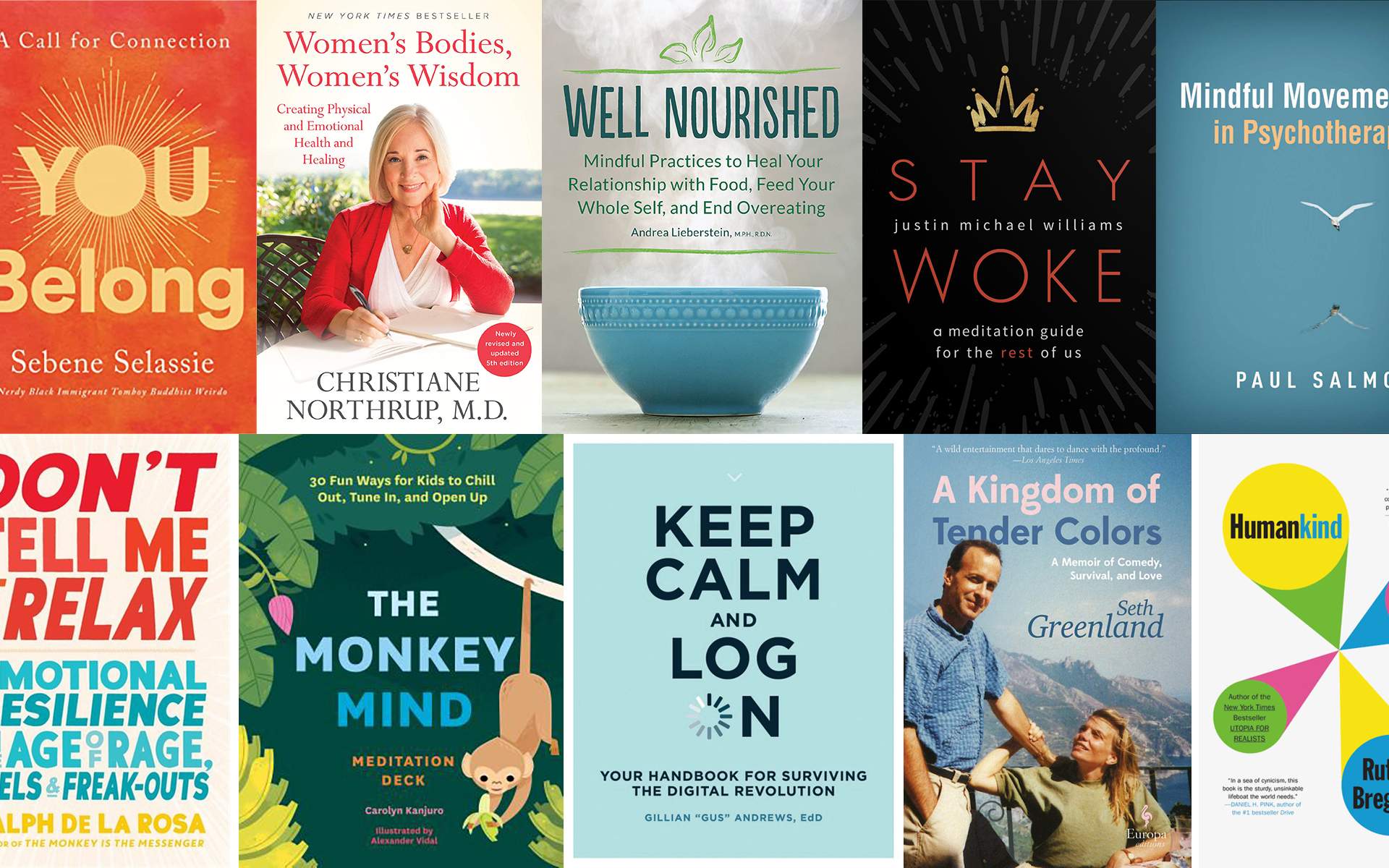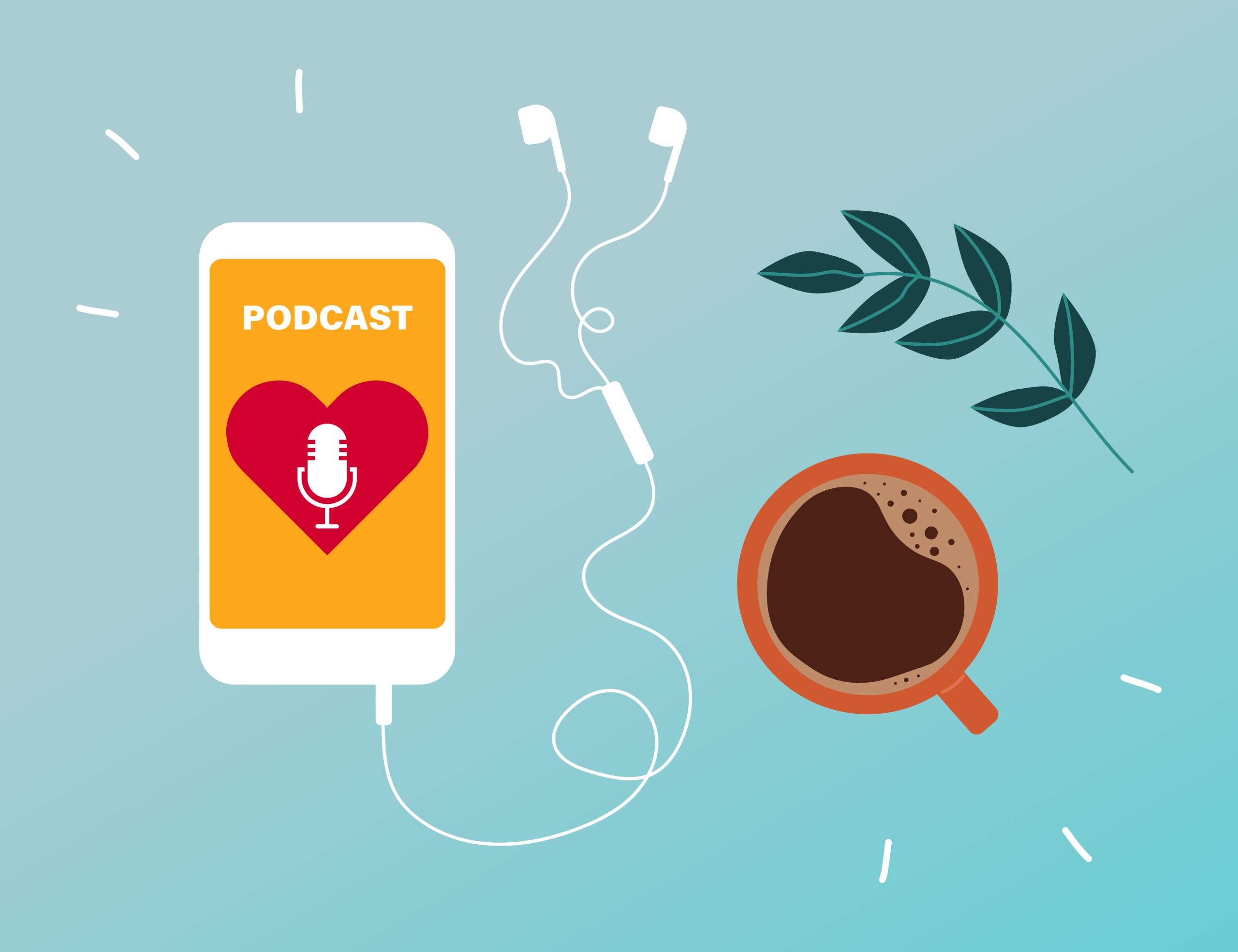1) This One and Wild Precious Life
The Path Back to Connection in a Fractured World
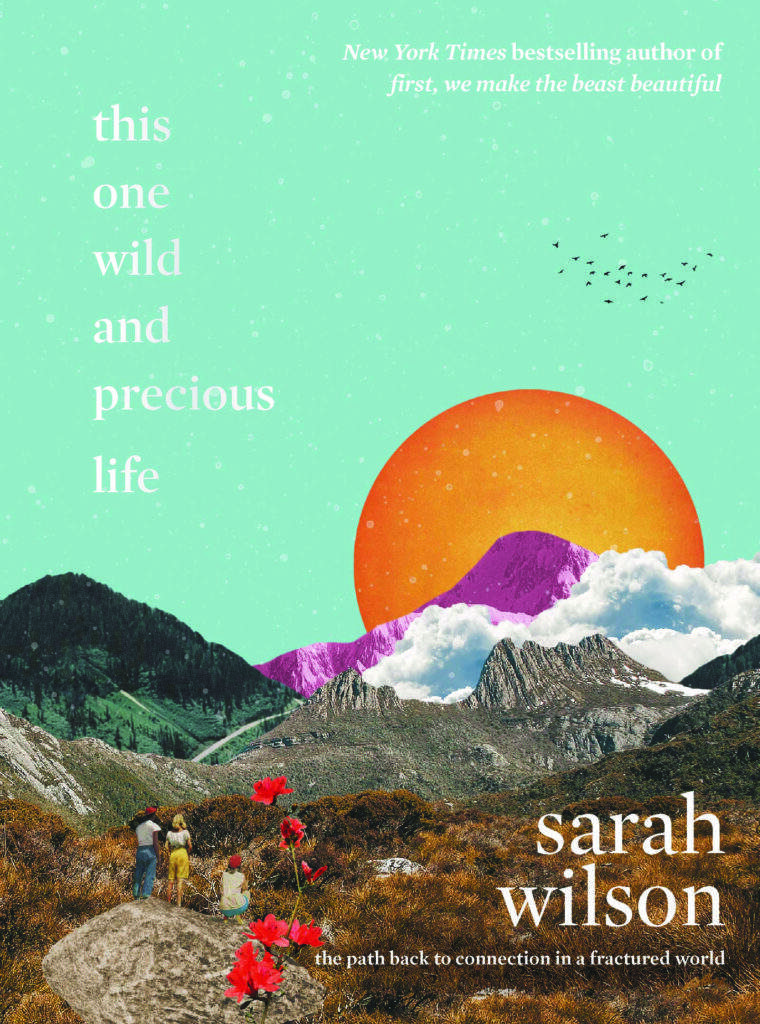
Anyone who read Sarah Wilson’s First, We Make the Beast Beautiful, her remarkable 2018 memoir about shifting our approach to anxiety and mental illness, will have high expectations for this new book. Her goal, she writes, was to find a way to talk about the feeling that “Something is not right. We’re not living life right. To try to grasp such a pain, to find the beginning and end, is like trying to bite your own teeth.” Instead of grasping too hard, then, she bravely explores what feels so wrong in her unforgettably wholehearted way. The common link among our personal, social, and global struggles—climate chaos, environmental destruction, local and global conflict, and our inability to come together to solve any of it—boils down, Wilson finds, to disconnection. The age of social distancing makes that truth more plain than ever before. So, where is healing to be found?
It sounds like an impossibly big task, but Wilson sets out to reconnect us with a series of short chapters, from “become a soul nerd” (unexpectedly, this is about evolutionary psychology) and “get full-fat spiritual” (an expansive vision of purpose and interconnectedness) to “start where you are #buylesslivemore.” She urges us to reconnect with ourselves, with our natural collectivity, with our higher selves, and with the earth. Interspersed with these topics are chapters about her many adventures hiking on nearly every continent, and how simply walking has shaped her understanding of life. On top of all this goodness, the book is peppered with poetry and with Wilson’s delightful marginalia. Whether it fires you up to change the world, or replenishes your sense of human goodness, this lovely book will not disappoint. -AT
2) What’s Your Story
A Journal for Everyday Evolution
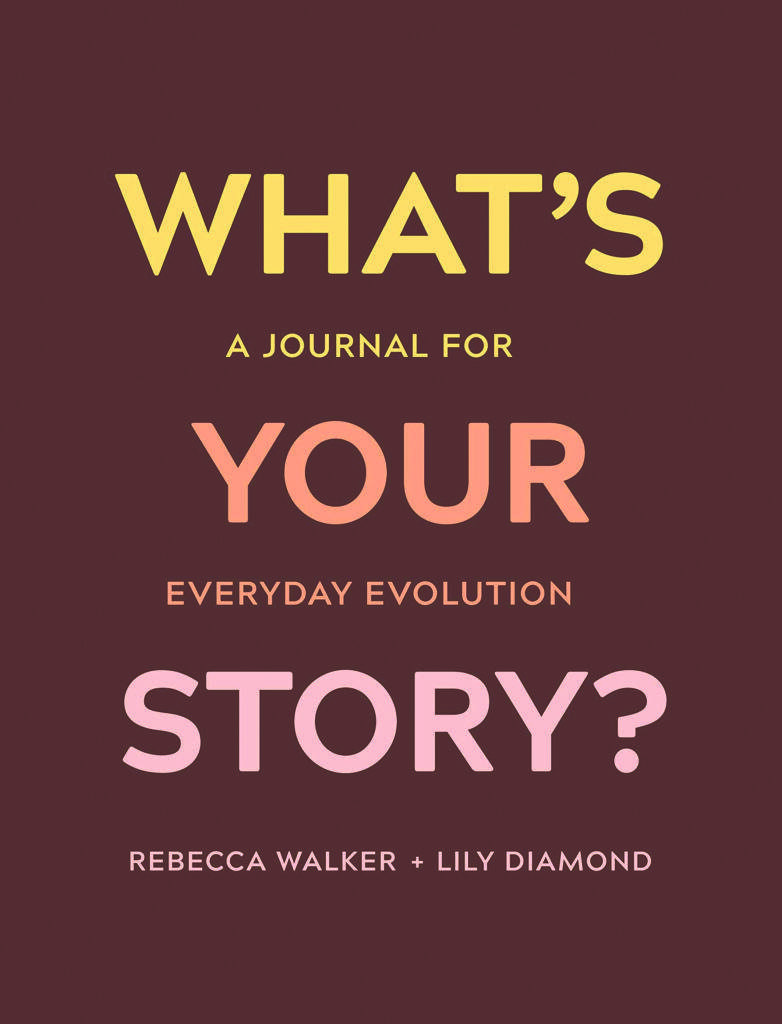
Rebecca Walker and Lily Diamond are no strangers to innovating the memoir. Several of Walker’s earlier published works are autobiographical—including Black, White & Jewish: Autobiography of a Shifting Self—while Diamond’s best-selling Kale & Caramel: Recipes for Body, Heart, and Table is a fusion of memoir and cookbook. Their established creativity within the genre, and the fact that they met at a memoir-writing workshop Walker was leading on Maui, forecast how thoughtfully they have crafted What’s Your Story?, a guided journal that not only helps the writer express emotions and thoughts, but leads them to grow more deeply into themselves on a level that’s conscious, joyful, and authentic.
Walker and Diamond assure readers, “you will look back, let go, and move forward. You will rigorously assess your thoughts and beliefs, and make decisions to write a more empowering truth into being.” The structure of the journal mirrors the ebb and flow of normal daily moments, rituals, interactions: You awaken, touch in with your body, relate to the people around you, and go about your work. The topics also dive into our connections to technology, spirituality, and nature—and, importantly, loss, grief, and mortality.
Be aware, you won’t find any half-baked journal prompts here—rather, soul-searching queries like “What are your assumptions about who, where, and what you should be at this moment in your life?” and “How do you relate to your state of mind over the course of a day? How can you make your mind an ally?” The progression of questions is skillfully designed to create a strong foundation of self-knowledge, both within chapters and as you move through the whole book. You’ll be asked to consider where you play within broader social dynamics: “What decisions have gone into crafting your online persona? What values do those decisions reflect?” and “Which people, places, and traditions have your communities lost?” It’s the process of dismantling your assumptions, the authors say, that “will allow you to tell a new story.” We have no doubt that the authors’ direct, kind, and confident voices will empower readers to find their own. —AT
3) Mindfulness-Based Stress Reduction
Protocol, Practice, and Teaching Skills
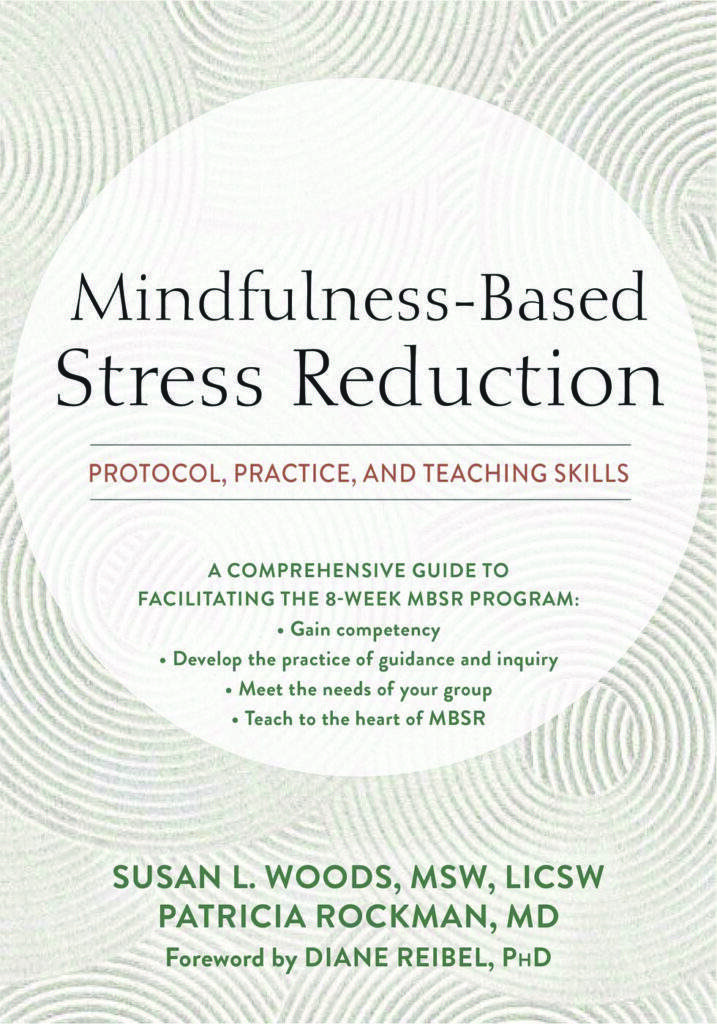
Patricia Rockman, MD •
New Harbinger
It’s easy to think that everything that needs to be said about Mindfulness-Based Stress Reduction has already been said. Woods and Rockman’s contribution, billed as “A Comprehensive Guide to Facilitating the 8-Week MBSR Program,” puts the lie to that. While MBSR’s founder, Jon Kabat-Zinn, established a standardized, repeatable format—which, among other benefits, allowed the program to be more easily subjected to research—he never intended it to become static and staid. He has often said it could just as easily have been called “heartfulness” as “mindfulness.” This book shows why.
Woods and Rockman amply demonstrate that MBSR exists to lessen suffering. Their goal is to help teachers “teach to the heart of MBSR,” which is not garden-variety self-improvement, but deep caring. It’s clear that decades of experience encountering participants has opened their hearts and invited them to explore how each person may be helped, listened to, and entered into a journey. For them, MBSR is a living, breathing organism, not merely a curriculum.
And yet, Woods and Rockman are clear that curriculum and protocol are essential to provide a container and guardrails within which teachers can be most effective. After opening with a little background on how MBSR emerged and what’s required to teach it, the next 100 pages
offer an expert tour of the eight sessions that form the curriculum. From there, they discuss
what lies “beyond curriculum”: the teacher’s embodiment of mindfulness and the inquiry process. Embodiment “consists of a teacher’s embracing of a present moment orientation” to
whatever arises, and inquiry is “the interactive manifestation of embodiment, the conversation that takes place between the teacher and the group about what has arisen during the mindfulness practices and exercises.” MBSR offers much more than calm acceptance and a shiny new storyline: It provides pathways to the depths of what makes us human. This book also offers in its final chapters and appendix a treasury of information and materials to support bringing MBSR into many real-world settings. -BB
4) Hello, Habits
A Minimalist’s Guide to a Better Life
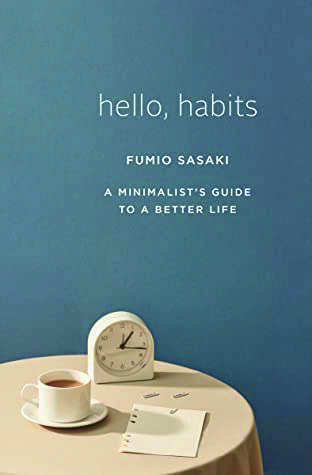
& Company
Fumio Sasaki explores human insecurity by tapping into his own vulnerability and exposing his fear of merely being average. He successfully demystifies the myth that legends are simply born and brings the goal of success down to earth, where it is available for everyone to touch. He does this in a series of steps that echoes the concept that legends are made with a set of recurring habits.
While the idea of structuring your life around a set of habits might seem rigid and lacking in spontaneity, Sasaki does a terrific job of highlighting the fact that we are already made of habits, which we can restructure and relearn. Hello, Habits is a self-help book that
aims to help without being condescending; it approachably breaks down the idea that success isn’t only for a lucky few, but for everyone willing to embrace new habits. -OL
5) Creative Mind, Happy Soul
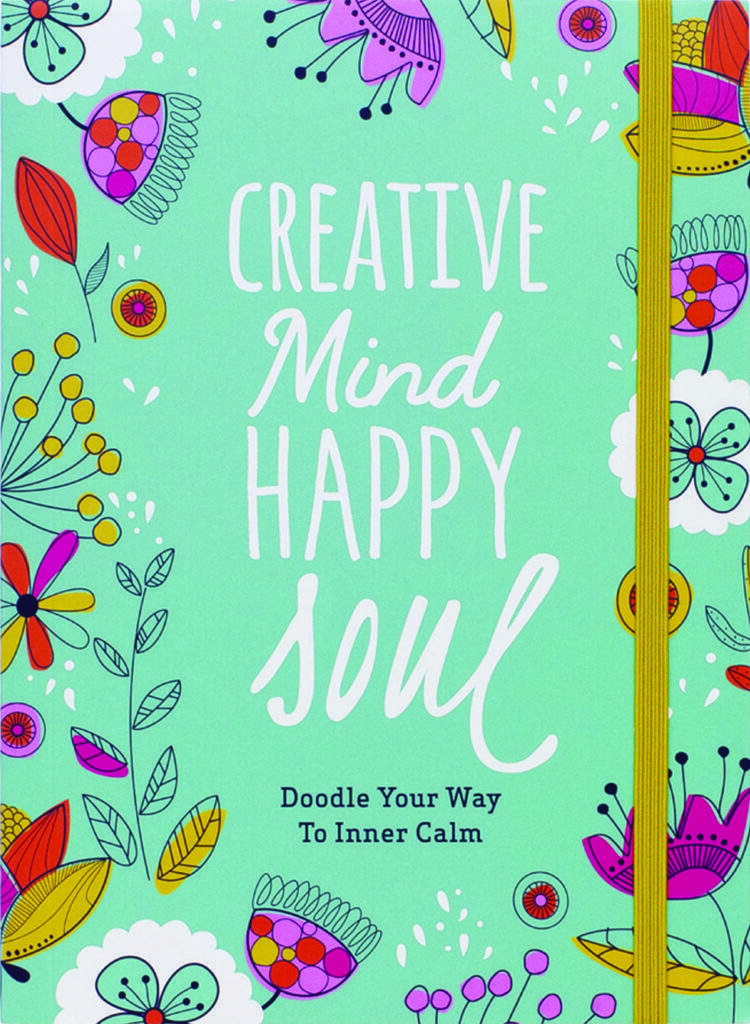
There’s more than one way to keep a journal, as Lloyd shows in her Doodle Lovely series. Her Creative Mind, Happy Soul guided journal is a colorful treasure, encouraging readers of any age to take a soothing creativity break. Every page includes a gratitude prompt and an emotional check-in. Some pages also have lined space to write, others, a variety of imaginative doodling prompts (no art skills required). Psychological research suggests this kind of “spontaneous drawing” helps us bypass the judgy part of the brain, allowing our inner creativity and playfulness to come through. Honestly, just flipping through it makes me happy. -AT
6) Deep Kindness
A Revolutionary Guide for the Way We Think, Talk, and Act in Kindness
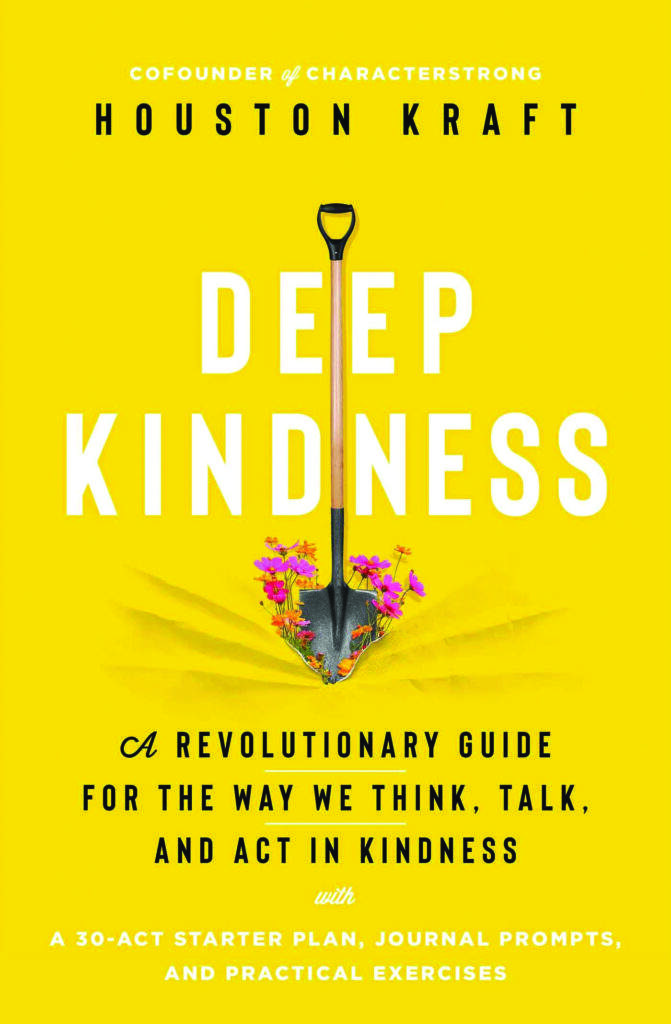
Here’s an engaging handbook for moving past “confetti kindness” (the stuff Instagram influencers promote) to the skillful, targeted, regular, deep kindness that, in Kraft’s words, “the world desperately needs.”
A few years into his work as a kindness motivational speaker, he meets Helga on a flight. She tells him the last time she flew, it was because her father was ailing. Upon arrival at her destination city, she received word he had died. She sank to the floor in the airport and wept for two hours, and not one person stopped to help. In that conversation, Kraft realizes he, too, a sought-after kindness expert, might have passed her by. That encounter taught Kraft to ask: What gets in the way of our being kind? He arrives at: incompetence, insecurity, and inconvenience. The book is organized around these barriers, with kindness exercises to take readers to the determined, practiced, habitual kindness Kraft believes will change the world.
-SD
7) Philanthropy Revolution
How to Inspire Donors, Build Relationships, and Make a Difference
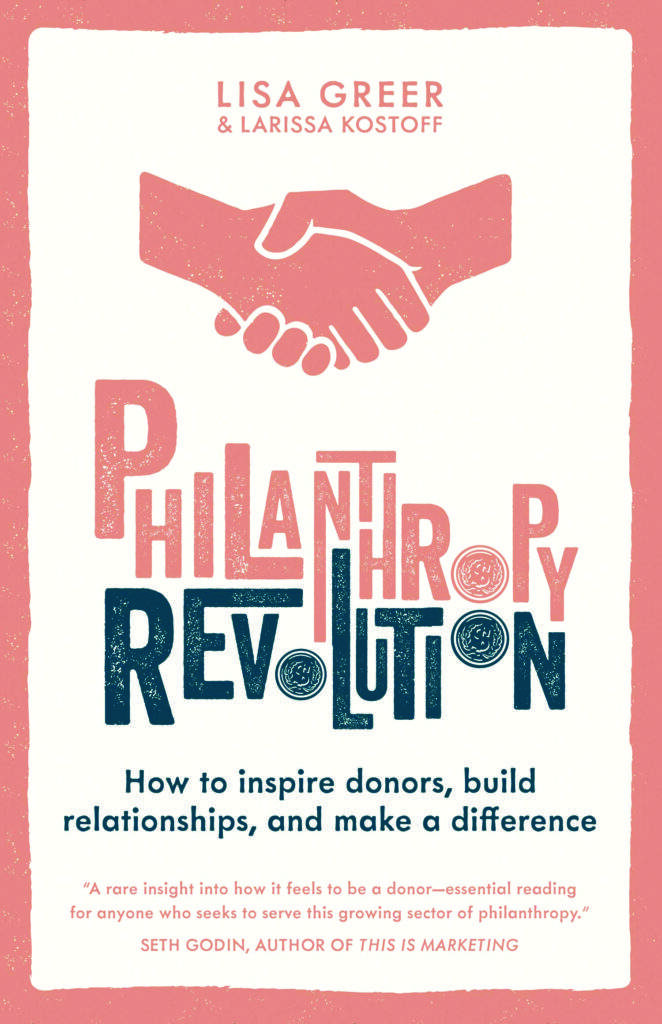
This extremely readable book—the only one, according to its publisher, written from a donor’s point of view—makes the case for a new way of giving, and receiving, philanthropic gifts. Lisa Greer’s husband invented a revolutionary bit of tech, and overnight, their family’s circumstances changed from paycheck-to-paycheck to wow-that’s-a-really-big-paycheck, and the Greers entered the world of large-gift philanthropy. Greer argues that as traditional philanthropy dies (literally—as donors to hospitals, foundations, arts organizations, and more are aging and dying), traditional fundraising methods that alienate new generations of would-be donors must die too. Greer is values-driven, and she wants to offer her experience and expertise along with her dough. Here, she makes an impassioned plea for authenticity, on the part of both donors and fundraisers. If both parties would be more real about what they’re seeking—and relational rather than transactional—nonprofits that rely on donors, and donors themselves, would be better served. -SD
8) Practicing Mindfulness
Finding Calm and Focus in Your Everyday Life
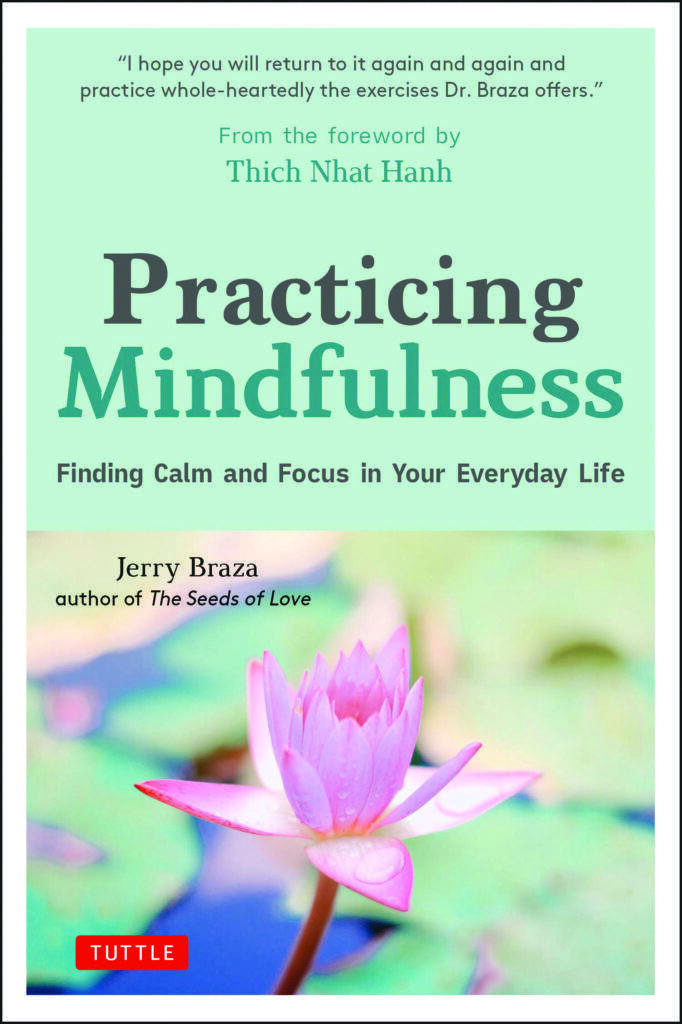
Each of the fourteen chapters in this handy little book is short, readily digestible, and presented in plain language. There are also many reflections and “tests” to engage you, so the experience is not simply about passively reading. Instead you enter into a dialogue with the
teacher within your own mind. For example, in the “Why Mindfulness?” chapter we’re asked to consider whether we “measure happiness by anticipated future outcomes” or “suffer from ‘hurry sickness,’” or “deny or push away pain.” Then, we are asked to get specific and consider a “stressful problem” in life and how mindfulness might reduce the distress it’s causing and mitigate some of its negative consequences. In this way, Braza is emphasizing the “everyday life” in the subtitle, so that mindfulness can become less an abstract goal and more of a practical skill that’s inherent to us all and that we can draw on in any situation. -BB
9) Step Back
How to Bring the Art of Reflection into Your Busy Life
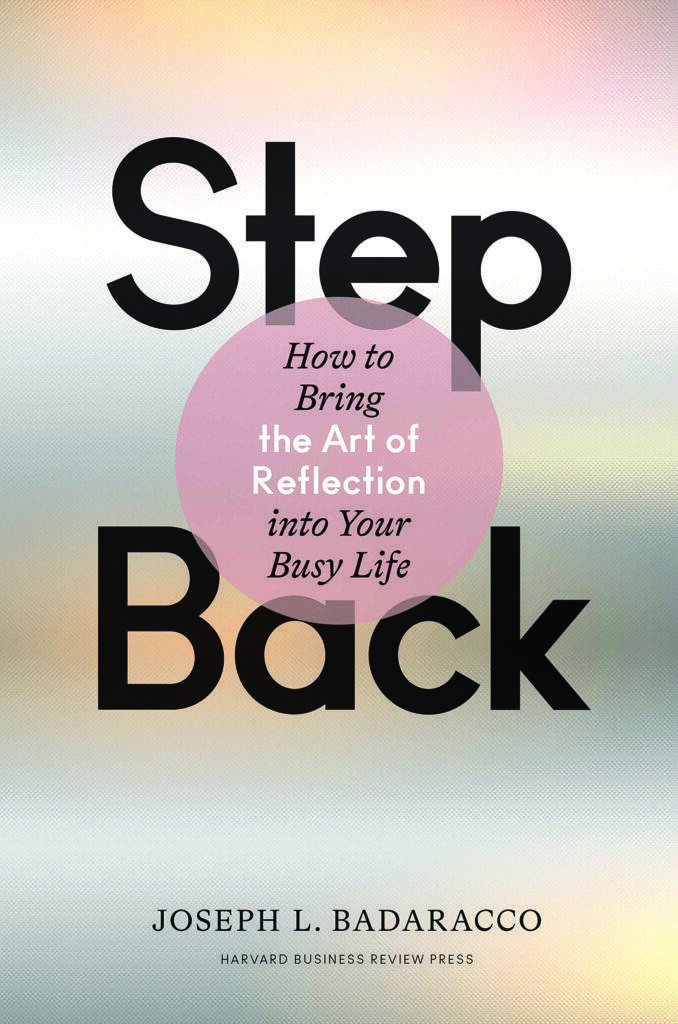
Harvard Business Review Press
What does reflection have to do with succeeding in business? Written for the executive who may not be intrigued by the word “mindfulness,” but who may be convinced by the John Shad Professor of Business Ethics at Harvard, Step Back is both accessible and well-researched. Badaracco draws from interviews with 100 managers who “had made thoughtful choices about how they wanted to live their lives and what they wanted to accomplish” in this slim volume that’s also a serious download of usable advice.
Badaracco goes into detail on each of four “design principles” that provide a template for the art of reflecting: Aim for good enough; Downshift occasionally; Ponder your hard issues; and Pause and measure up. These principles reflect not only what’s realistic in a high-paced life, but also some pithy distillations from philosophers like de Montaigne. It’s almost a truism now that you don’t need X time per day to meditate in order to practice mindfulness. Still, this book is a skillful contribution to that message. -AT
10) Grammar for a Full Life
How The Ways We Shape a Sentence Can Limit or Enlarge Us
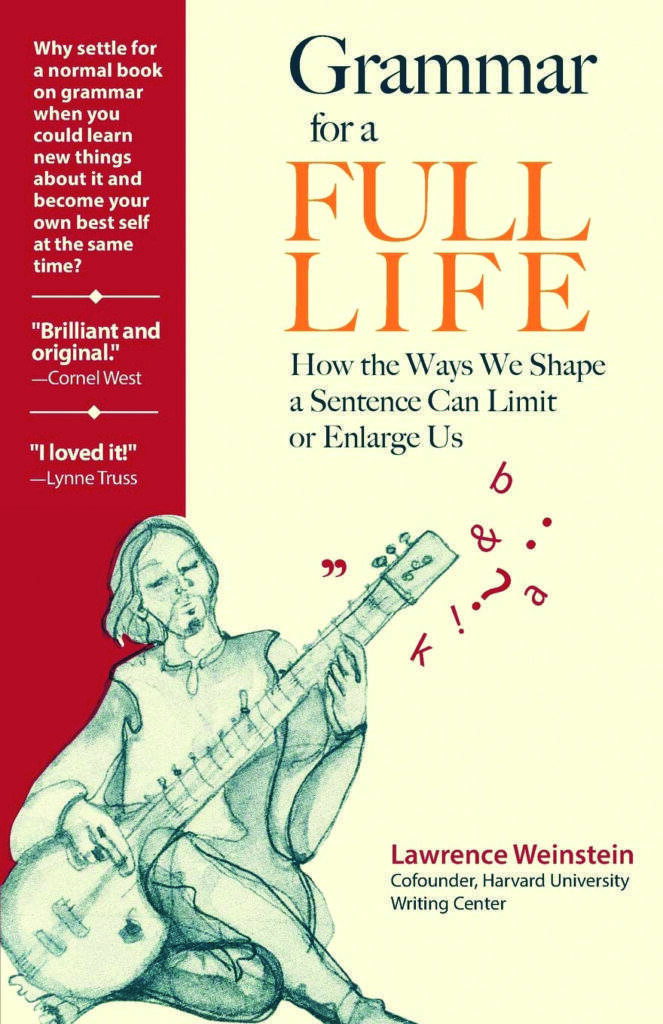
Lexigraphic Publishing
There’s a well-worn admonition, variously credited to Lao Tzu, Mahatma Gandhi, and Margaret Thatcher, to “watch your thoughts for they become your words, watch your words for they become your actions, watch your actions for they become your character, watch your character for it becomes your destiny.” Lawrence Weinstein might offer a friendly amendment to watch your grammar, for it becomes your way of being in the world.
Weinstein, cofounder of the Harvard Writing Center and now the director of Bentley University’s Expository Writing Program, is equal parts grammarian and mindfulness coach in this nerdishly charming handbook for better living through grammar. He makes the case many a writing coach does in favor of the active voice, which enlivens writing. But Weinstein further notes that the passive voice robs us of agency, making us more acted upon than acting. When we reframe “I’ve been on hold for 10 minutes,” to “I’ve been holding for 10 minutes,” he argues, we can see the choice we have in the matter—and we can continue to hold, or we can hang up. Similarly, he invites readers to consider the imperative form as an opportunity to engage with assertiveness; crossing out and editing as ways to self-improvement; and for those of us who hew tightly to rules of grammar, to make space for new constructions and allow the language and the rules governing it to evolve, because this “can be the occasion for learning how to deal with change of all kinds in this world.”
Chapters include “Grammar to Take Life in Hand,” “Grammar For Morale,” and “Grammar For Mindfulness,” which includes an impassioned argument against exclamation marks because they can be mongers of fear, which is an inspired take on punctuation and its power. Weinstein even includes a chapter on death and dying, called “Grammar For The End.” Weinstein is terrific company throughout the book: pedantic enough to please the grammar freaks, but with a puckish sense of humor, and a clear and cogent argument that a more mindful life just might begin with good grammar. -SD
Three Mindful Podcasts to Listen to Now
1) Meditative Story
Episode: “Stories of New Beginnings”
In the season 2 finale of Meditative Story, we get a melting-pot perspective on new beginnings from five different people. Each of their stories is rooted in a shared human experience, from the unspoken conversations surrounding life and death to feeling like an outcast and finally finding a space that feels like home. It’s a podcast that makes you feel a little less isolated reinforcing that you’re not alone in your feelings. Among the wide range of guests you’ll be sure to hear a voice that resonates, especially in the times we’re living in right now. It makes us excited for what season 3 has in store. -OL
2) Taking Off the Mask
Episode: “The Conqueror Narrative”
In this insight-filled conversation on his recently launched podcast, Ashanti Branch and social entrepreneur and engineer Chris Ategeka discuss their experiences with the “conqueror narrative”: When we talk about success stories, we often neglect the complexities of where someone came from and how they struggled to “conquer” their circumstances. They bring in Branch’s Million Masks movement and why being vulnerable, even with those we trust, can be difficult. “Everything in life comes down to two things. It’s safety and security,” Ategeka says, and that includes how readily we allow ourselves to be open and honest about what we’re going through. -AT
2) Ten Percent Happier
Episode: “Depression and Anxiety: Your Old Enemies, Your Best Friends” with Zindel Segal
Zindel Segal, Distinguished Professor of Mood Disorders at the University of Toronto and founder of Mindfulness-Based Cognitive Therapy (MBCT), talks with Dan Harris about what first intrigued him about the science of mindfulness, and why treatments like MBCT help us “make friends” with depression and anxiety. “The real way of bringing curiosity,” to our mind, Segal says, “also has [kindness] embedded in it, so that as you see these features show up in your body, there’s also a kindness to the person who’s experiencing this.” Or, as Harris quips: “There is this notion of slaying the dragon in Western myth, but actually, hugging the dragon is a much better form of disarmament.” -AT
read more
The Best Mindfulness Books of 2020
The Mindful editors look back on their favourite books from this year, covering diverse topics such as mindful eating, the truth of belonging, and emotional resilience.
Read More
6 Podcast Episodes We Loved in 2020
Need a few more podcasts to round out your year’s listening? Check out these highlights from the Mindful editors.
Read More
4 Books We’re Reading to Replenish Our Energy
From exploring emotional resilience to dabbling in mindful eating, here are four books (and three podcasts) to nourish your body and mind.
Read More



